SPECIAL REPORT : Part 404
By Shamindra Ferdinando
The Japanese Embassy in Colombo on the afternoon of January 19 organised a joint media briefing at Sasakawa Hall with the participation of Sri Lankan Foreign Minister Prof. G.L. Peiris to announce plans for the 70th anniversary commemoration of the establishment of diplomatic relations between the two countries. Among those who addressed the media, in addition to twice Foreign Minister Prof. Peiris, were Foreign Secretary Admiral Prof. Jayanath Colombage and Japanese Ambassador in Colombo Mizukoshi Hideaki.
Prof. Peiris served as the External Affairs Minister (2010-2015) and was re-appointed in August 2021.
The current status of Sri Lanka-Japan relations cannot be discussed without taking into consideration the alignment or, more appropriately, the ganging up of certain Western powers and their allies against the People’s Republic of China whose relationship with Sri Lanka has irked the US-led grouping. Let me, briefly mention three other recent events/developments, namely visits undertaken here by the UK Minister of State for South Asia, the United Nations and the Commonwealth Lord Tariq Ahmad and the Speaker of the National Assembly of the Republic of Korea, Park Byeong-Seug and a sudden shocking Canadian Travel Advisory primarily targeting Sri Lanka’s efforts to revive tourism, before examination of Sri Lanka-Japan diplomatic relations.
Japan, Korea, the UK and Canada are part of the US-led coalition against China. There is absolutely no ambiguity in their stand. In line with their overall strategic objectives, they pursue an agenda inimical to war-winning Sri Lanka at the Geneva-based United Nations Human Rights Council (UNHRC). Unfortunately overwhelmed by their well-rehearsed chorus, backed by their International NGO hacks, Sri Lanka lacked political will at least to set the record straight. Over 12 years after the successful conclusion of the war against the Liberation Tigers of Tamil Eelam (LTTE) despite all odds arraigned against us, Sri Lanka remains entangled in a well-coordinated so-called accountability process meant to undermine the country. Continuing humiliation of the war-winning armed forces is part of their overall strategy.
Three years after the war (March 2012), a resolution targeting Sri Lanka was adopted at the UNHRC. Twenty four countries voted against Sri Lanka, 15 for the country, whereas eight abstained. India voted against Sri Lanka. The UK, Japan and Korea didn’t represent the UNHRC at that time. Sri Lanka’s current Ambassador in Washington Mahinda Samarasinghe led the government delegation.
The UNHRC membership is based on equitable geographical distribution. Seats are distributed as follows: African States 13 seats, Asia-Pacific States 13 seats, Latin American and Caribbean States eight seats, Western European and other States seven seats and Eastern European States six seats.
At the March 2014 session, the UNHRC adopted a resolution that paved the way for the HRC Chief, who is obviously a part of the conspiracy against countries like Sri Lanka targeted by the self-appointed international community of the West, to undertake a comprehensive investigation into alleged serious violations and abuses of human rights and related crimes ostensibly against both parties in Sri Lanka. But in actual fact it is only Colombo that they are targeting! While the Tiger military/terror machine was vanquished on the banks of the Nanthikadal lagoon in May 2009 by the security forces, those like the TNA that backed the LTTE terror machine to the hilt, until the very end, continue to be the darlings of the West. The resolution was adopted thanks to the Western clout with 23 countries in favour, 12 against and 12 abstentions. Korea and the UK voted in favour, whereas India and Japan abstained.
Korea and the UK again voted in favour of the anti-Sri Lanka resolution at the March 2021 session whereas Japan and India abstained. Korea and the UK were among 22 countries which denounced Sri Lanka. Eleven countries opposed the resolution while the rest abstained. Those who skipped the vote included New Delhi and Tokyo. The March 2021 resolution empowered the HRC Chief to collect and store information that could lead to international criminal proceedings.
Moving beyond Comprehensive Partnership
In between the second (March 2014) and third resolutions (March 2021), Sri Lanka co-sponsored a resolution (Oct 2015) against her own armed forces. Within a week after the Geneva betrayal, the then Prime Minister Ranil Wickremesinghe entered into a Comprehensive Partnership Agreement (CPA) with Japan. The signing took place in Tokyo on Oct 6, 2015. The then Japanese Premier Shinzo Abe signed on behalf of Japan. The CPA has to be considered against the backdrop of Tokyo being part of ‘Quad’ (Quadrilateral Security Dialogue) comprising the US, India, Australia and Japan arrayed against China.
Ambassador Hideaki’s predecessor Akira Sugiyama last November called for further expansion of Japan – Sri Lanka ties beyond the CPA between the two countries on the eve of his departure from Colombo having concluded his term.
At his farewell meet with Prof. Peiris Ambassador Sugiyama has said that 70th anniversary celebrations would be a fitting occasion to enhance existing CPA to a further height.
In spite of tremendous pressure, South Korea has refrained from joining Quad as Seoul obviously does not want to antagonise China, its major trading partner. In the context of North and South Korean relations, Seoul cannot under any circumstances take a hostile stand against China, though South Korea being home to a strong US military presence. However, tiny Sri Lanka is not so lucky. Therefore, Sri Lanka shouldn’t expect South Korean support at the UNHRC. Seoul contributed to Sri Lanka’s humiliation both at the 2014 and 2021 sessions. In case, the US-UK alliance pushed for further action against Sri Lanka at the UNHRC this year, would South Korea be able at least to abstain in view of the 45th anniversary of formalising diplomatic ties with Sri Lanka.
Would South Korea ultimately end-up in Quad? The US led alliance is keen to bring Sri Lanka under its domain though China, too, appears to be well positioned here to enhance its influence. Chinese Foreign Minister Wang Yi‘s recent whistle-stop visit to Colombo underscored how serious the Chinese took their project here. Sri Lanka should carefully examine the Quad approach as well as how individual countries responded to Colombo’s relationship with Beijing. Having allowed Chinese flagship project here, the Colombo Port City from the reclaimed sea, Sri Lanka cannot envisage an environment free of a string of Chinese presence here. In spite of pressure exerted by Western powers and India, Sri Lanka cannot adopt policies at the expense of China, an all-weather friend like Pakistan.
Sri Lanka faces a daunting challenge in balancing its relations with China and the US-led alliance that included India. Economically weak Sri Lanka can be exploited by both camps. The current dispensation as well as the Opposition should be mindful of their designs. Regardless of political differences, political parties represented in Parliament should seek consensus on foreign policy and related matters. A few corrupt politicians and officials shouldn’t be allowed to make personal gains at the expense of national interest. That is the stark and ugly truth.
UK’s agenda
Following Lord Tariq Ahmad’s meeting with President Gotabaya Rajapaksa at the Presidential Secretariat, the PMD (Presidential Media Division) issued a statement titled ‘Sri Lanka’s progress over human rights highly commendable….’ That statement quoted Ahmad as having declared at the meeting attended by Prof. Peiris and British High Commissioner in Colombo Sarah Hulton that Sri Lanka’s programme to empower human rights was making great strides. The PMD quoted him further that Sri Lanka would be able to resolve all issues pertaining to human rights by moving forward with a pragmatic approach to strengthen it. The PMD quoted President Gotabaya Rajapaksa as having requested Lord Ahmad to provide an opportunity for discussions with the UK-based Diaspora. According to the PMD statement the President has assured the UK that his government aimed to solve all issues faced by Sri Lankans and create an environment where all Sri Lankans could live as one people.
However, Lord Ahmad in a short video issued at the end of his visit which he described as incredible three days certainly did not give any indication to support the PMD declaration as regards Sri Lanka’s progress on human rights.
First of all, the government should keep in mind that the UK, a member of the current UNHRC and the leader of the Sri Lanka Core Group at Geneva, wouldn’t do anything to ease pressure on Sri Lanka, especially ahead of the forthcoming Geneva session. Having succeeded the US as Sri Lanka Core Group leader, the UK relentlessly pursued Sri Lanka on the basis of unsubstantiated war crimes allegations. In spite of repeated calls by Lord Naseby to consider wartime (January-May 2009) UK High Commission dispatches from Colombo as part of the overall efforts to ascertain the truth, the UK has refused to do so.
We have to recall the fact that the UK became a great power not through sheer hard work the way the modern China has done. In fact it was one of the first narco-states dealing in opium, which brought China to its knees. It always plundered much of the world by a policy of divide and rule of its subjects as in Sri Lanka. And the problems here are without doubt the result of that policy, which favoured especially the minority Tamils over others. The same problems can be seen even in places like Burma to this day, where insurgencies are still engineered/financed mainly by the West. We will not go into India because the servile Premier Modi having got a seat at the head table of the Western camp and blinded by its glitter obviously often can’t see beyond his nose. Indians often forget how they were treated like lepers by the West till the collapse of the Soviet Union and how everything possible was done to undermine it and even to break it up.
Lord Naseby following over a two-year legal battle with his government in Oct 2017 disclosed a section of the dispatches from Colombo. The rest of the dispatches hadn’t been released on the basis their disclosure would undermine UK’s relations with Sri Lanka. During Dinesh Gunawardene’s tenure as the Foreign Minister, the UK turned down Sri Lanka’s request to submit the relevant documents to the UNHRC. President Rajapaksa brought in Prof. Peiris as his Foreign Minister last August.
Obviously the UK suppressed diplomatic cables sent by its wartime Defence Attaché Lt. Colonel Anthony Gash from the British High Commission, Colombo, because they ran counter to the claims made by the western bloc as regards Sri Lanka at the UNHRC.
Having visited Jaffna and Trincomalee, in addition to his meetings in Colombo, Lord Ahmad, in his video message made reference to human rights defenders and civil society representatives. The UK Human Rights Minister declared while he discussed a broad range of issues, including education, environment, investment opportunities as well as economy with government leaders, human rights defenders and members of the civil society shared with him the challenges faced by them.
It would be pertinent to ask whether any of those categorised as human rights defenders and civil society at least privately requested the British High Commission intervention in the wake of the LTTE using civilian human shield on the Vanni (east) front in 2009. The TNA leader R. Sampanthan, MP, who declared the LTTE as the sole representative of the Tamil speaking people way back in 2001 was among those who met Lord Ahmad. Lawmaker Sampanthan never ever bothered to speak on behalf of those who had been trapped on the Vanni East front though he raised accountability issues at the end of the war.
The British, too, never sought at least an explanation from those who cooperated with the LTTE’s agenda. If the British are keen for reconciliation and justice for what had happened in the past as stressed by Lord Ahmad in his video message, the UK cannot ignore its own role in the once India-run separatist project.
The UK allowed the LTTE absolute freedom of movement in its territory where millions of Sterling Pounds were raised to procure weapons. The LTTE had its so-called International Secretariat in London at the time it assassinated former Indian Premier Rajiv Gandhi in May 1991, over a year after New Delhi ended its military mission in Sri Lanka. One-time British High Commission employee Anton Stanislaus Balasingham, in spite of being the theoretician of a murderous organisation, enjoyed the status as a British citizen until his demise in Dec 2006. The UK had no issue with Balasingham’s British citizenship even after the assassination of the then Foreign Minister Lakshman Kadirgamar in August 2005. The terrorist was allowed to operate freely. The late Balasingham’s wife, Adele, in spite of having promoted the LTTE’s despicable cause and even privy to the assassination of Gandhi by a female suicide bomber still lives there. When Lord Ahmad talked of the past, obviously he was only referring to alleged atrocities committed by the Sri Lankan military.
UK pursuing hostile strategy
The recent BBC reportage on Sri Lanka underscores continuing British hostility towards Sri Lanka. In spite of China being one of the major trading partners of the British, the latter in line with overall US-fashioned policy takes a hostile view of Sri Lanka’s relationship with China. The UK spearheaded efforts to set up a special investigation targeting Sri Lanka following the March 2021 Geneva session. Lord Ahmad’s recent visit and his promise to come back here again very soon wouldn’t change a thing. The British would continue to undermine Sri Lanka essentially for two reasons (i) Sri Lanka-China relationship and influential Tamil Diaspora relationship with all British political parties.
Regardless of Sri Lanka’s Opposition, Western powers ensured the setting up of high profile special investigation (Sept 2021 to Sept 2022) against the country to complete the encirclement of Sri Lanka at the UNHRC. The investigation is now underway. Did Sri Lanka at least raise the issue during Lord Ahmad’s recently concluded visit here? Sri Lanka shouldn’t expect fair play under any circumstances. The special investigation, too, will justify previous unsubstantiated accusations. Hope, the current dispensation, particularly the Foreign Ministry hadn’t conveniently forgotten how the yahapalana government co-sponsored a resolution against the war-winning armed forces on the basis of accusations that weren’t examined in a court of law. What really intrigued the public is the UN declaration that the identity of those who made accusations would be covered by confidentiality clauses for a 20-year period. As the declaration has been made in March 2011, Sri Lanka wouldn’t have an opportunity to know its accusers or at least whether they existed till 2031. Even then they have left a provision to extend that confidential clause for a further period. Where is the rule of law in all that, though always mouthed by the West of its virtues like a parrot?
Let me get back to the investigation led by a Senior Level Advisor in terms of the UNHRC dictate. Declaring that the UNHRC expected the Senior Legal Advisor to have (verbatim) experience in international criminal justice and/or criminal investigations and prosecutions to coordinate the team and oversee an information and evidence collection strategy; the development of a central repository to consolidate, preserve and analyse information and evidence; coordinate the processes of reviewing and sharing of information with national authorities for universal jurisdiction and extraterritorial jurisdiction cases and other accountability purposes in line with relevant United Nations guidelines; develop accountability strategies and engage with accountability mechanisms including specialised investigators, prosecutors, judges, and other legal practitioners both for information sharing purposes, to promote accountability and advise on the development of accountability strategies; and liaise with other parts of OHCHR, other independent mechanisms and the UN system to ensure a coordinated approach”
It is not too difficult to understand where we are heading. It would be the responsibility of the current dispensation to set the record straight in Geneva and New York without further delay. The Tamil National Alliance (TNA) participated in an abortive political project to elect war-winning Army Commander the then Gen. Sarath Fonseka as the President at the 2010 presidential poll should be officially made known in Geneva and New York. The fact that Fonseka comfortably won electoral districts with Tamil speaking majority, too, should be part of Sri Lanka’s defence. Shouldn’t Sri Lanka ask those shedding crocodile tears for war victims why the Tamil speaking people, including those living in the Vanni who suffered dearly voted for the man whose Army was accused of killing over 40,000 Tamils?
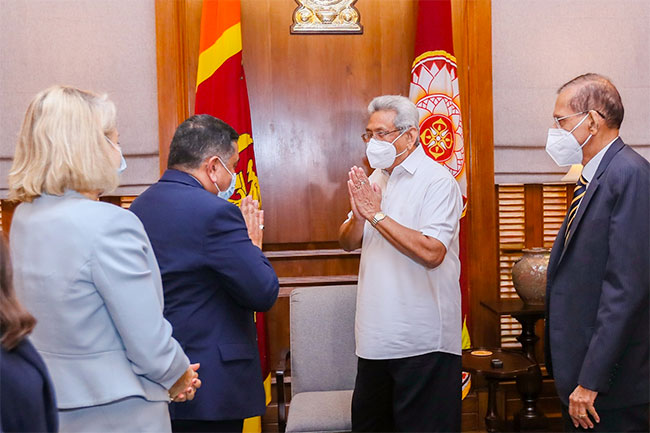
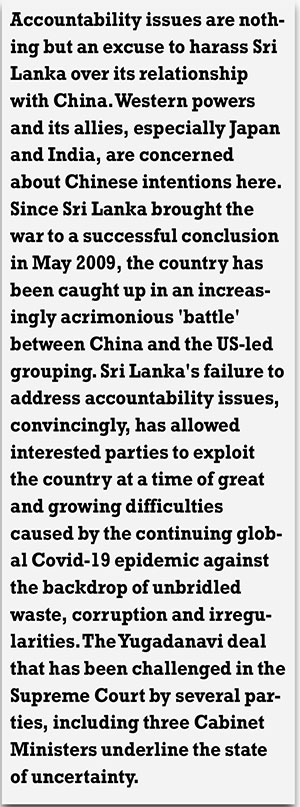 Japan, Korea, the UK and Canada are part of the US-led coalition against China. There is absolutely no ambiguity in their stand. In line with their overall strategic objectives, they pursue an agenda inimical to war-winning Sri Lanka at the Geneva-based United Nations Human Rights Council (UNHRC). Unfortunately overwhelmed by their well-rehearsed chorus, backed by their International NGO hacks, Sri Lanka lacked political will at least to set the record straight. Over 12 years after the successful conclusion of the war against the Liberation Tigers of Tamil Eelam (LTTE) despite all odds arraigned against us, Sri Lanka remains entangled in a well-coordinated so-called accountability process meant to undermine the country. Continuing humiliation of the war-winning armed forces is part of their overall strategy.
Japan, Korea, the UK and Canada are part of the US-led coalition against China. There is absolutely no ambiguity in their stand. In line with their overall strategic objectives, they pursue an agenda inimical to war-winning Sri Lanka at the Geneva-based United Nations Human Rights Council (UNHRC). Unfortunately overwhelmed by their well-rehearsed chorus, backed by their International NGO hacks, Sri Lanka lacked political will at least to set the record straight. Over 12 years after the successful conclusion of the war against the Liberation Tigers of Tamil Eelam (LTTE) despite all odds arraigned against us, Sri Lanka remains entangled in a well-coordinated so-called accountability process meant to undermine the country. Continuing humiliation of the war-winning armed forces is part of their overall strategy.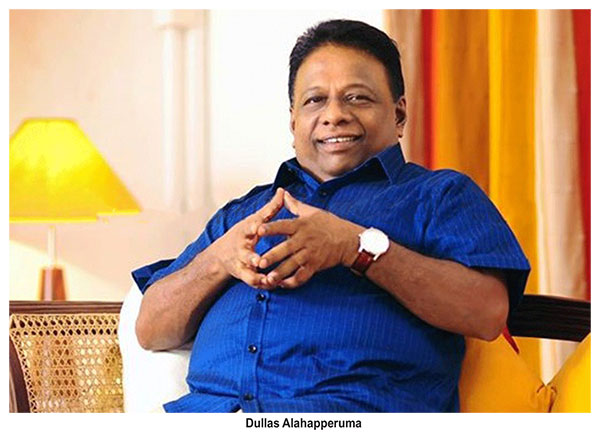
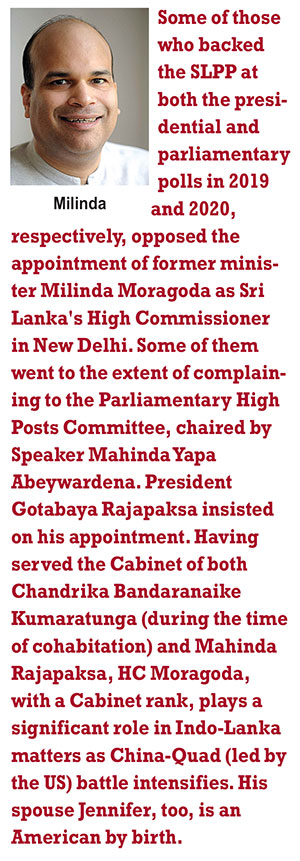 The lawmaker emphasised the failure on the part of the government to take the public into confidence and the responsibility of the Cabinet members and the officials to speak the truth.
The lawmaker emphasised the failure on the part of the government to take the public into confidence and the responsibility of the Cabinet members and the officials to speak the truth.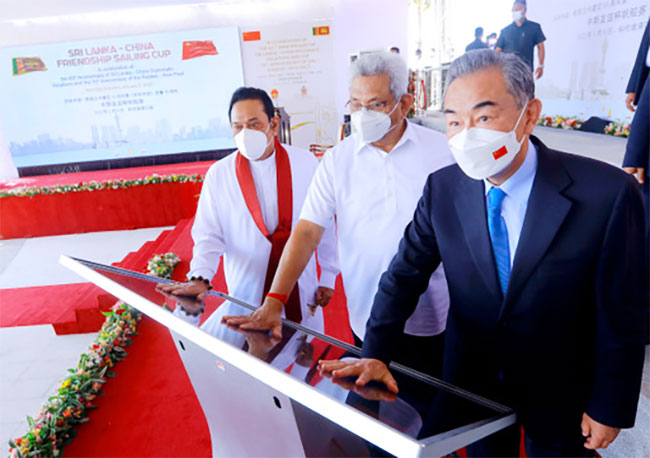
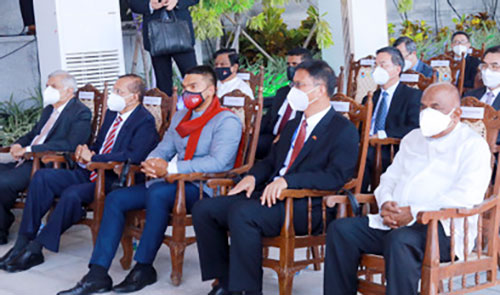 Former PM Wickremesinghe, FM Prof. Peiris, Minister Namal Rajapaksa and Chinese Ambassador to Colombo Qi Zhenhong at the launch of Sri Lanka China Friendship Sailing Cup at the Port City last Sunday (pics courtesy PM Media)
Former PM Wickremesinghe, FM Prof. Peiris, Minister Namal Rajapaksa and Chinese Ambassador to Colombo Qi Zhenhong at the launch of Sri Lanka China Friendship Sailing Cup at the Port City last Sunday (pics courtesy PM Media)